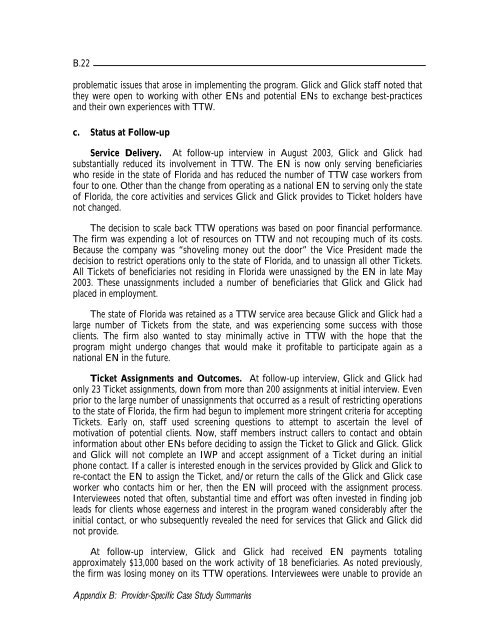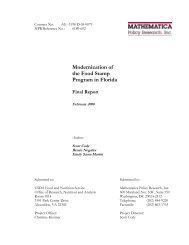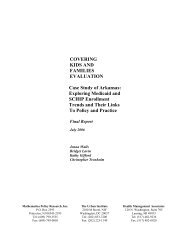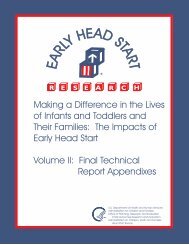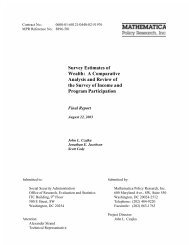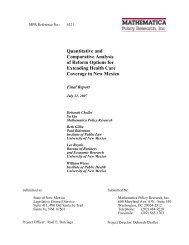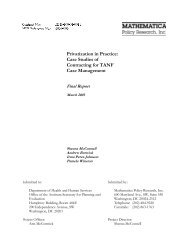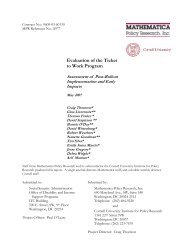Evaluation of the Ticket to Work Program Initial Evaluation Report
Evaluation of the Ticket to Work Program Initial Evaluation Report
Evaluation of the Ticket to Work Program Initial Evaluation Report
Create successful ePaper yourself
Turn your PDF publications into a flip-book with our unique Google optimized e-Paper software.
B.22<br />
problematic issues that arose in implementing <strong>the</strong> program. Glick and Glick staff noted that<br />
<strong>the</strong>y were open <strong>to</strong> working with o<strong>the</strong>r ENs and potential ENs <strong>to</strong> exchange best-practices<br />
and <strong>the</strong>ir own experiences with TTW.<br />
c. Status at Follow-up<br />
Service Delivery. At follow-up interview in August 2003, Glick and Glick had<br />
substantially reduced its involvement in TTW. The EN is now only serving beneficiaries<br />
who reside in <strong>the</strong> state <strong>of</strong> Florida and has reduced <strong>the</strong> number <strong>of</strong> TTW case workers from<br />
four <strong>to</strong> one. O<strong>the</strong>r than <strong>the</strong> change from operating as a national EN <strong>to</strong> serving only <strong>the</strong> state<br />
<strong>of</strong> Florida, <strong>the</strong> core activities and services Glick and Glick provides <strong>to</strong> <strong>Ticket</strong> holders have<br />
not changed.<br />
The decision <strong>to</strong> scale back TTW operations was based on poor financial performance.<br />
The firm was expending a lot <strong>of</strong> resources on TTW and not recouping much <strong>of</strong> its costs.<br />
Because <strong>the</strong> company was “shoveling money out <strong>the</strong> door” <strong>the</strong> Vice President made <strong>the</strong><br />
decision <strong>to</strong> restrict operations only <strong>to</strong> <strong>the</strong> state <strong>of</strong> Florida, and <strong>to</strong> unassign all o<strong>the</strong>r <strong>Ticket</strong>s.<br />
All <strong>Ticket</strong>s <strong>of</strong> beneficiaries not residing in Florida were unassigned by <strong>the</strong> EN in late May<br />
2003. These unassignments included a number <strong>of</strong> beneficiaries that Glick and Glick had<br />
placed in employment.<br />
The state <strong>of</strong> Florida was retained as a TTW service area because Glick and Glick had a<br />
large number <strong>of</strong> <strong>Ticket</strong>s from <strong>the</strong> state, and was experiencing some success with those<br />
clients. The firm also wanted <strong>to</strong> stay minimally active in TTW with <strong>the</strong> hope that <strong>the</strong><br />
program might undergo changes that would make it pr<strong>of</strong>itable <strong>to</strong> participate again as a<br />
national EN in <strong>the</strong> future.<br />
<strong>Ticket</strong> Assignments and Outcomes. At follow-up interview, Glick and Glick had<br />
only 23 <strong>Ticket</strong> assignments, down from more than 200 assignments at initial interview. Even<br />
prior <strong>to</strong> <strong>the</strong> large number <strong>of</strong> unassignments that occurred as a result <strong>of</strong> restricting operations<br />
<strong>to</strong> <strong>the</strong> state <strong>of</strong> Florida, <strong>the</strong> firm had begun <strong>to</strong> implement more stringent criteria for accepting<br />
<strong>Ticket</strong>s. Early on, staff used screening questions <strong>to</strong> attempt <strong>to</strong> ascertain <strong>the</strong> level <strong>of</strong><br />
motivation <strong>of</strong> potential clients. Now, staff members instruct callers <strong>to</strong> contact and obtain<br />
information about o<strong>the</strong>r ENs before deciding <strong>to</strong> assign <strong>the</strong> <strong>Ticket</strong> <strong>to</strong> Glick and Glick. Glick<br />
and Glick will not complete an IWP and accept assignment <strong>of</strong> a <strong>Ticket</strong> during an initial<br />
phone contact. If a caller is interested enough in <strong>the</strong> services provided by Glick and Glick <strong>to</strong><br />
re-contact <strong>the</strong> EN <strong>to</strong> assign <strong>the</strong> <strong>Ticket</strong>, and/or return <strong>the</strong> calls <strong>of</strong> <strong>the</strong> Glick and Glick case<br />
worker who contacts him or her, <strong>the</strong>n <strong>the</strong> EN will proceed with <strong>the</strong> assignment process.<br />
Interviewees noted that <strong>of</strong>ten, substantial time and effort was <strong>of</strong>ten invested in finding job<br />
leads for clients whose eagerness and interest in <strong>the</strong> program waned considerably after <strong>the</strong><br />
initial contact, or who subsequently revealed <strong>the</strong> need for services that Glick and Glick did<br />
not provide.<br />
At follow-up interview, Glick and Glick had received EN payments <strong>to</strong>taling<br />
approximately $13,000 based on <strong>the</strong> work activity <strong>of</strong> 18 beneficiaries. As noted previously,<br />
<strong>the</strong> firm was losing money on its TTW operations. Interviewees were unable <strong>to</strong> provide an<br />
Appendix B: Provider-Specific Case Study Summaries


